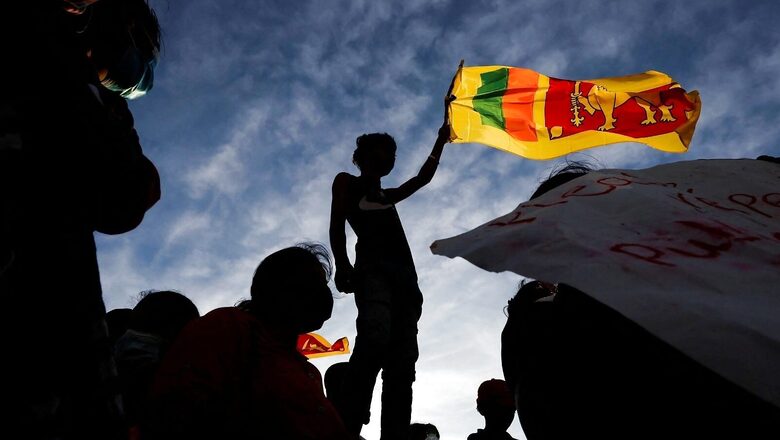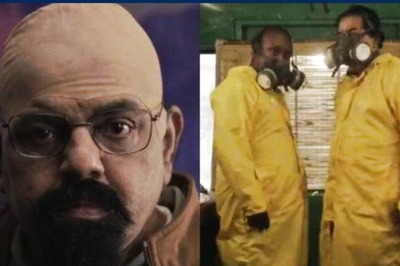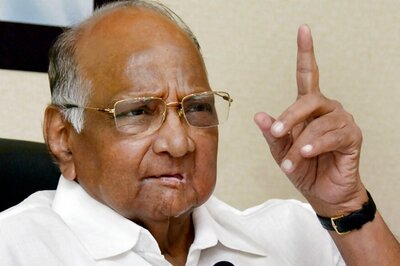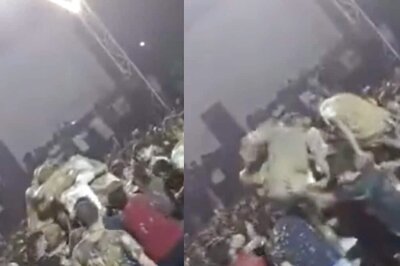
views
On May 9, the largely peaceful anti-Rajapaksa protests in Sri Lanka took a violent turn. In the resulting violence, nine people died, including two policemen, with the agitating crowd burning down the home of Prime Minister Mahinda Rajapaksa. Subsequently, while the Prime Minister resigned, his younger brother Gotabaya Rajapaksa remained the President. Facing nationwide civil unrest, the government imposed a curfew on May 9 and issued shoot at sight orders on those engaging in violence. Though the appointment of Ranil Wickremesinghe as Prime Minister has provided a semblance of political stability in the country, the protesters have refused to budge from their demand for the resignation of President Gotabaya.
The continuing political and economic instability in Sri Lanka gave voice to the Indians on social media, supporting military intervention in the country. On May 10, former Rajya Sabha MP Subramanian Swamy tweeted that “India must send in the Indian Army to restore Constitutional sanity. At present anti Indian foreign forces are taking advantage of people’s anger. This affects India’s national security”. Then, on May 11, in response to a tweet, he argued that “Protecting Rajapaksas is in India’s national interest”. He made a case for Indian intervention by stating that “Burning down the residences even of the Prime Minister, shooting dead MPs by mobs means rioters don’t deserve any mercy. We cannot allow another Libya in our neighbourhood.”
Undoubtedly, the continued instability in India’s immediate south has significant implications for the country’s strategic interests. Firstly, if the economic situation does not stabilise quickly, a massive influx of refugees in Tamil Nadu would be likely. Already, India hosts more than 100,000 refugees from Sri Lanka. Another wave of migration would create a humanitarian situation in the state. With the growing reports of Sri Lankan Tamils reaching the Tamil Nadu coast, the dangers of a humanitarian crisis are growing by the day.
ALSO READ | How a Meltdown in Sri Lanka Can Have Serious Implications for India’s Security
Secondly, the continued instability in Sri Lanka might also create a security problem for India due to the long-standing linkages between the island’s Islamist groups like the National Thowheed Jamath (NTJ) with Pakistan-based Jihadi outfits such as the Lashkar-e-Taiba. The NTJ had carried out the Easter Attacks in April 2019, leading to a subsequent ban on the organisation in Sri Lanka. The political instability in Sri Lanka coupled with the migration of the island’s Tamil population to India would create conducive conditions for terrorist attacks in the country. The recent reports of possible LTTE activity point in this direction.
However, India’s military intervention or support to the Rajapaksa family would be detrimental to its long-term interests in Sri Lanka. The economic meltdown in Sri Lanka had forced China’s primary clients in the country – the Rajapaksa family – to seek help from India. The persistent rise of anti-China sentiments and suspicions of debt-trap diplomacy among the Sinhalese nationalists paved this turn in the Rajapaksa family’s politics. Thus, as India began to provide concessional loans and lines of credit worth $3.5 billion to Sri Lanka, the Rajapaksa government cleared several Indian projects that were stuck in limbo. It recently signed two maritime security pacts with New Delhi to install coastal radar systems and operate a floating dock facility and Dornier maritime reconnaissance aircraft provided by India.
The growing trend of strong India-Sri Lanka bilateral ties is likely to continue with the appointment of Ranil Wickremesinghe as the new Prime Minister of the country. This means that China’s influence to halt the progress of India’s economic projects in Sri Lanka would remain limited. During his previous tenure, Wickremesinghe had attempted economic restructuring with the help of the IMF, leading to a primary account surplus for the first time since 1954. However, his outreach to India and the US was opposed by President Sirisena, leading to his unconstitutional dismissal in 2018, with Mahinda Rajapaksa becoming Prime Minister for 51 days. While a subsequent Supreme Court ruling restored him to his position, the United National Party (UNP) grew weaker under his leadership and suffered massive defeats in the subsequent Presidential and Parliamentary elections.
Therefore, Wickremesinghe’s return as the Prime Minister has limited chances of restoring stability in the country. Having lost his seat during the 2020 Parliamentary elections and following the creation of the breakaway Samagi Jana Balawegaya (SJB) from the UNP under his leadership, Wickremesinghe has to rule without any political strength of his own. While Maithripala Sirisena-led Sri Lanka Freedom Party (SLFP) has announced its support for Wickremesinghe, Sajith Premadasa-led SJB has refused to accept portfolios in Wickremesinghe’s government. Further, the country’s key religious leaders have objected to his appointment as Prime Minister. Therefore, Wickremesinghe’s ability to bring political stability to Sri Lanka remains uncertain.
The Sri Lankan economic crisis induced a reset in the island’s relationship with India while ultimately limiting China’s influence in the country. However, if the Wickremesinghe government fails to achieve political stability, the economic situation in Sri Lanka will likely deteriorate. Further, the continuing instability would strengthen the military’s role in civil affairs, thereby harming the democratic prospects of the country. In this regard, the ouster of the Rajapaksa family from Sri Lankan politics would offer both opportunities and challenges to India. Nonetheless, rather than military intervention, New Delhi should use its influence upon Gotabaya Rajapaksa to make him abolish the executive Presidency and form an all-party government. Nothing short of Gotabaya’s removal would suffice the Sri Lankan masses. Therefore, for political stability in Sri Lanka, India should act in the interest of the Sri Lankan public rather than support the country’s corrupt politicians.
Shrey Khanna is a Staff Research Analyst, Indo-Pacific Studies Programme, at The Takshashila Institution. The views expressed in this article are those of the author and do not represent the stand of this publication.
Read all the Latest Opinions here




















Comments
0 comment